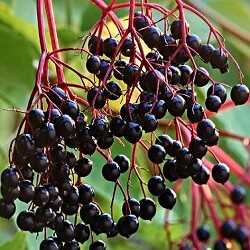Elderberry:
 Elderberry (Sambucus nigra) is a versatile and widely recognized plant known for its medicinal, culinary, and historical significance. Native to Europe, North America, and some parts of Asia, elderberry has been used for centuries by various cultures for its potential health benefits and flavorful properties.
Elderberry (Sambucus nigra) is a versatile and widely recognized plant known for its medicinal, culinary, and historical significance. Native to Europe, North America, and some parts of Asia, elderberry has been used for centuries by various cultures for its potential health benefits and flavorful properties.
Appearance and Growth: Elderberry is a deciduous shrub or small tree that can reach heights of up to 10 meters (33 feet). It typically features compound leaves with serrated edges and clusters of small, creamy-white flowers that develop into clusters of small, dark purple to black berries. These berries are the most well-known and utilized part of the elderberry plant.
Culinary Uses: Elderberries have a tart and slightly sweet flavor, making them suitable for a variety of culinary applications. They can be used to make jams, jellies, sauces, pies, and even wines. Elderberry-based syrups and beverages are also popular, particularly during the cold and flu seasons due to their potential immune-boosting properties.
Medicinal Benefits: Elderberries are renowned for their potential health benefits, especially in supporting the immune system. They are rich in antioxidants, vitamins (such as vitamin C), and flavonoids, which are believed to contribute to their immune-boosting effects. Elderberries have been traditionally used to help alleviate symptoms of colds, flu, and other respiratory infections. They are often consumed in the form of syrups, capsules, or teas for this purpose.
Potential Considerations: While elderberries offer many potential benefits, it’s important to note that consuming raw elderberries or their unprocessed parts can be toxic. The seeds and stems of elderberries contain cyanogenic glycosides, which can release cyanide when ingested. To safely enjoy the benefits of elderberries, it’s recommended to cook or process them properly before consumption.
Traditional and Folklore: Elderberries have a rich history in folklore and traditional beliefs. In various cultures, elderberry plants were thought to possess protective and healing properties. The elder tree was sometimes associated with superstitions and beliefs, often being seen as a tree with connections to both the spiritual world and the natural world.
Modern Research: In recent years, scientific interest in elderberries has grown, with studies investigating their potential health benefits. Research has explored their antiviral, anti-inflammatory, and antioxidant properties, particularly in relation to respiratory infections. While elderberry supplements and products are available, it’s important to rely on reputable sources and consult with healthcare professionals before using them for specific health concerns.
In conclusion, elderberry is a fascinating plant with a long history of culinary, medicinal, and cultural significance. Its vibrant berries and potential health benefits continue to intrigue researchers and consumers alike, reminding us of the diverse and powerful properties that nature provides.
Vitamins:
Other beneficial natural products:
